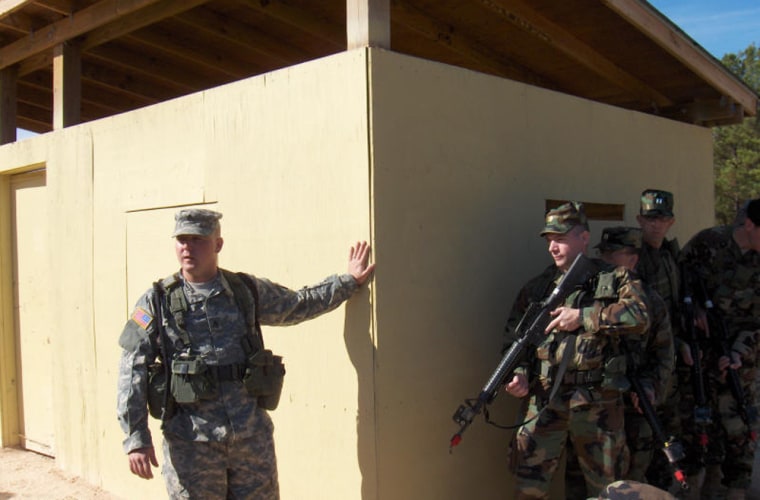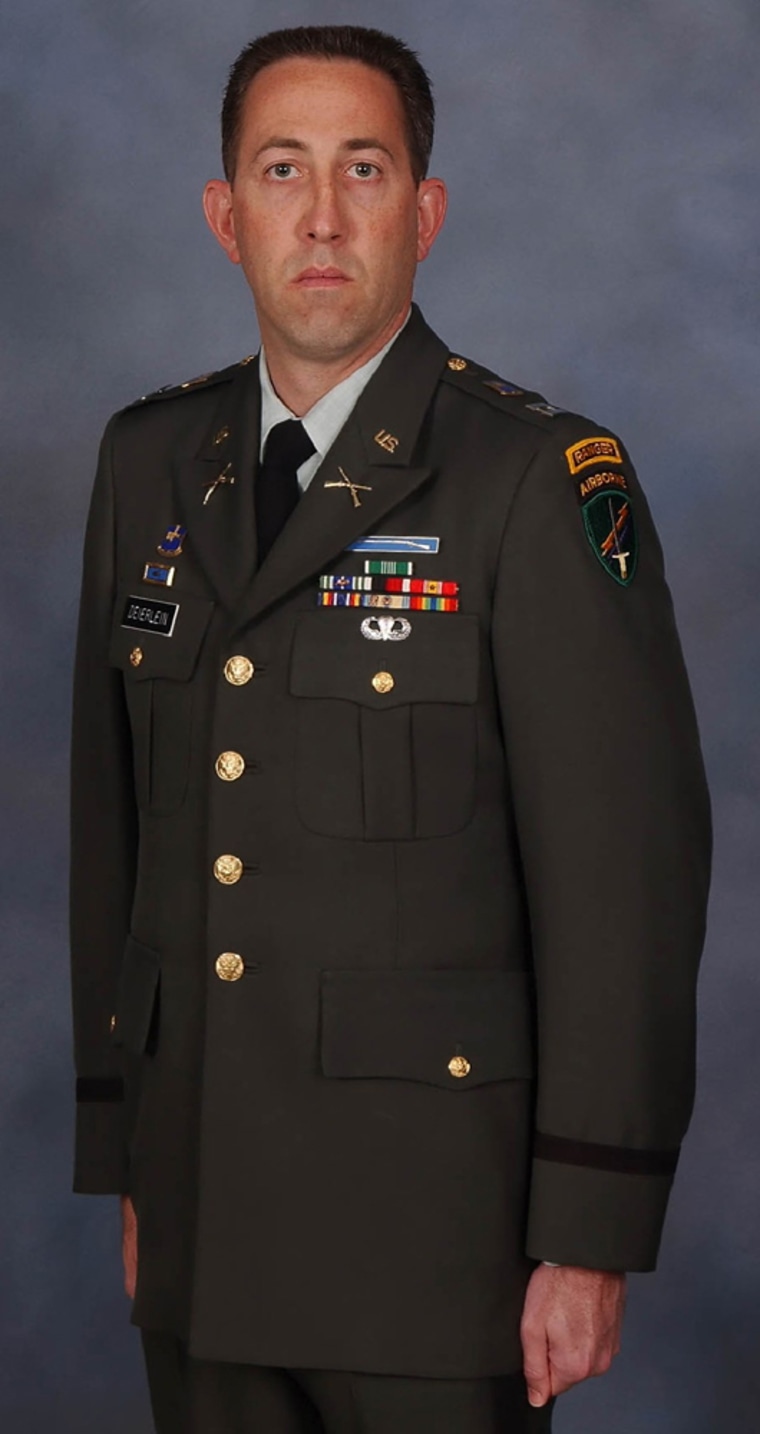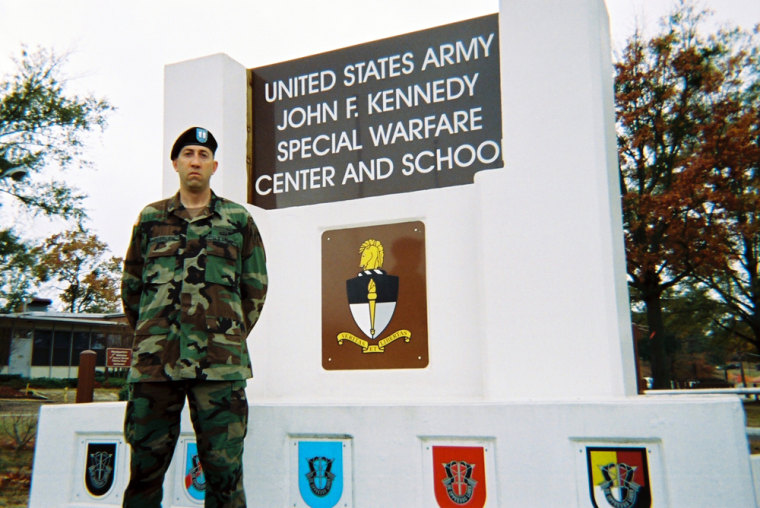Let’s just say reality has finally sunk in and I am no longer waking up each morning and thinking, “Wow! That was weird, I just had the oddest dream, I had a dream that I had to go back in the Army ...”
— Excerpt from an e-mail message Tom Deierlein sent on March 7, 2006, while training to go to Iraq
As Tom Deierlein answered the call to active duty, the Army told him again that he didn’t have to respond.
At a morning briefing at Fort Jackson, S.C., in November 2005, Army officials told Deierlein and most of the other officers present that they were free to go back home.
Some already knew they didn’t have to be there. Deierlein, a 38-year-old executive from Manhattan who had been shocked to receive call-up orders in the mail, got a phone call three days before he left for Fort Jackson. An Army official told him he had fulfilled his eight-year military service obligation years ago. He decided to report anyway.
Others were bowled over by the news. Many had packed up their belongings, taken leaves from their jobs, broken leases, attended going-away parties and said difficult goodbyes to spouses, parents and children — for nothing. Most had been out of uniform for eight to 10 years — not quite as long as Deierlein’s 12 years, but still a considerable time without any military training. A few had been out for 14 years or more.
When they had questioned their call-ups a month earlier, they had been threatened with jail time. But now that they had upended their lives and relocated, they were free to go? How could this be?
A shift in policy
Here’s what happened: In July 2005, the U.S. Department of Defense changed a longstanding policy governing how and when officers in the Individual Ready Reserve can be called up.
Prior to the change, whether they realized it or not, officers remained officers for life unless they formally resigned their commissions. Many officers in the Individual Ready Reserve have insisted they were unaware of that requirement; they thought their military obligations ended after eight years. Army officials contend that the resignation requirement was well known among officers.
The Defense Department unveiled its new policy on July 16, 2005, after aggrieved officers who were ordered to Iraq sued the Army on the grounds that their military commitments had ended years earlier.
The policy shift was significant. It meant that instead of having to take the initiative to resign, officers had to take action to stay in the military past the eight-year mark. This put officers in the same position as the rank and file.
Lt. Col. Bryan Hilferty, an Army spokesman, said the Defense Department changed the policy in response to complaints.
“The DOD said, ‘OK, we understand that all the enlisted people have taken positive steps to remain in,’” Hilferty explained. “‘In order to stop the complaints and be fair … let’s make sure everyone has to take those same positive steps to remain in.’”
But if the policy changed in July 2005, why were officers still receiving call-up orders in the mail and being warned about warrants for their arrest as late as October of that year?
Hilferty said the change didn’t take effect until Nov. 4, 2005 — nearly four months after the Defense Department released the new policy and one day before Deierlein’s accelerated wedding. That’s when Brig. Gen. Sean Byrne, the Army’s director of military personnel management, signed a memo outlining how the policy change would be implemented.
“Honestly, that’s not that long of a time period,” Hilferty said.
A daunting decision
Capt. Bill Billeter, a graduate student who had just abandoned his classes at West Virginia University with one semester to go, staggered out of the briefing in shock. He didn’t know what to do.
In the past month he had blown his family’s budget moving his pregnant wife, their 4-year-old son and all their belongings to Florida so she could be near her family when she had the baby. Unlike Deierlein, he hadn’t been reachable by phone in the final days before training because he’d been piloting a U-Haul truck almost 1,000 miles south to St. Petersburg, then driving more than 500 miles north to this Army post in South Carolina.
If he stayed in the military as a captain, he’d make about $80,000 a year tax-free — money that could help support his growing family. He’d also miss the birth of his second child.
If he bailed on his Army service, he knew he’d feel guilty. He’d been feeling guilty anyway, sitting on the sidelines, watching the Iraq war unfold on TV.
Billeter found a phone and called his wife.
“What do you think?” he asked her.
“Honey, I’ll support you no matter what.”
A diverse group
Nearly 1,000 Army officers who remained in the Individual Ready Reserve past their eight-year obligations have served in Iraq since the war began, according to the Army’s Human Resources Command.
Deierlein was struck by the diversity of the 50 or so officers who reported for duty with him on Nov. 13, 2005. The group included some executives, an investment banker, two policemen, a firefighter, a U.S. air marshal, two lawyers, a judge, a Home Depot store manager, a real estate agent, a chemist, a journalist, a couple of students and an engineer.
“Too many have small children — even a few newborns,” Deierlein wrote in his first monthly e-mail update to his friends and family.
The angst and emotional turmoil were palpable among the officers — one of the first groups of reserve soldiers to be given a choice, albeit a last-minute one, to resign their commissions and leave or to stay and go to Iraq.
All but a couple decided to stay, including Billeter.
Hilferty, the Army spokesman, acknowledged that these officers found themselves in a tough spot.
“It would be hard to be there and (to have) told all your friends you’re going and then to go back home,” he said.
But he denied there was any attempt to pressure the ready reservists.
“It wasn’t our policy to tell people (at Fort Jackson) to trick them into going,” Hilferty said. “That would have been reprehensible.”
‘Welcome back training’
The officers spent 10 days at Fort Jackson receiving what Deierlein called “welcome back training”: brushing up on first aid and mapping skills, relearning how to shoot 9mm pistols and M-16 rifles, memorizing dozens of confusing acronyms and abbreviations that would become everyday terms when they reached Iraq.

They also had to start jogging and doing sit-ups and push-ups again. Many of the reservists, now well into their 30s and 40s, couldn’t pass their first physical fitness test. One weighed more than 250 pounds and had a heart stent.
Deierlein had a history of being fit — running cross-country, summiting Mount Rainier — but he hadn’t worked out consistently for years. He knew he needed to lose some weight and get back into shape. While he did pass that initial physical fitness test, those early days of training tested his confidence.
“Still feel a bit like a fish out of some partly familiar waters,” Deierlein wrote to friends and family. “More than anything I am annoyed that I can’t do some of the things I used to do in my sleep.”
He could run a mile in 6:30, but he couldn’t manage a single pull-up. He could shoot at expert level with a 9mm pistol, but he barely qualified with the M-16.
After a few days off for Thanksgiving, the reservists reported to Fort Bragg, N.C., where they would live in World War II barracks and receive the remainder of their training before deployment. A few of them would be sent to Afghanistan and the Horn of Africa, but most were bound for Iraq. The soldiers had five months to prepare themselves to survive in a war zone.
‘The long, slow burn’
The first few weeks at Fort Bragg were packed with training: a civil affairs qualification course, followed by five days of field exercises to confirm that the officers knew how to execute civil affairs missions.
For those bound for Iraq, that would mean traveling dangerous streets and trying to help local Iraqi officials get utilities and other basic infrastructure up and running again. It would be a tall order for people with little or no experience with Arab culture or city planning. They wanted to do a good job, though, and they tackled the civil affairs course with diligence.
Rather than live in Fort Bragg’s barracks for five months, Deierlein and another officer rented a small apartment near the Army post. He relished the 10-day break he was given over Christmas and New Year’s. He traveled to Atlanta to see his wife, Hiwot, who had recently landed a job there as a pilot intern.
After Christmas break, the pace slowed dramatically for the officers. For weeks on end, they said, they were essentially left on their own, with no training scheduled.
“For probably four months of that six months of training we just sat on our thumbs,” Billeter recalled. “Some thought maybe they made a mistake and called us up too early. My wife called it ‘the long, slow burn’ — just sitting around waiting to go to Iraq. …
“I don’t want to sound too bitter, but it really seemed like they didn’t have a plan for us, like we were a pretty low priority. Once I got over there (to Iraq), I had a million things to learn. It took me months to learn what I needed to know to be effective. Those months at Bragg could have been spent learning a lot of that.”
‘We trained ourselves’
Capt. Drew Corbin, 32, a firefighter from Austin, Texas, said the officers would talk among themselves and try to think up exercises that might prove useful in Iraq.
“We trained ourselves,” Corbin said. “We had to develop classes ourselves. We went down to the motor pool and we all signed up to get our Humvee licenses. Then we started to do some basic weapons skills that we had to do ourselves. … We all became medically qualified as combat lifesavers. It was all planned and coordinated by ourselves.”
Tina Beller, a spokeswoman for the Army’s Civil Affairs and Psychological Operations Command, said the soldiers couldn’t have pursued such instruction in an individualized way.
“The tasks they said they had to go find on their own and do on their own — that’s impossible,” Beller said. “Those tasks are mandatory. The Army has to provide that instruction to you, with an instructor. …
“Why would we not want to give them that training? That saves their lives.”
The soldiers in Deierlein’s class agreed that instructors helped them complete many of their qualifications. But they said they had to do plenty of networking to find that instruction.
“Yes, we did have instructors, but that’s because we begged, borrowed and stole to get ‘em,” Corbin recalled. “We’d go to an infantry unit and say, ‘We’re stuck. We’re kind of rusty. Can we borrow your weapons for a day? Can you please help us out?’ And then we’d get the training that way.”
Billeter said he was grateful that other Army units came through for them when they asked for help. “The Civil Affairs Command can’t take any credit for the training we found,” he said. “From my perspective, they just flat failed us.”
Learning about roadside bombs
For most of the soldiers, it was a struggle to make the time go by quickly enough. Some read books about Iraq. Others played paintball.

He and the other officers also soaked up as much information as possible about roadside bombs, suicide bombers, sniper attacks and other realities of urban warfare.
“I try not to worry about those things,” Deierlein wrote in an e-mail message home. “Mainly I try to get excited about what will definitely be an exciting, challenging and personally rewarding experience. …
“The reality is this is a very dangerous job since we go out each and every day and work with the locals in fairly small teams. Of the 50 of us, about five will get injured and, according to the colonel, one or two will not make it home.”
